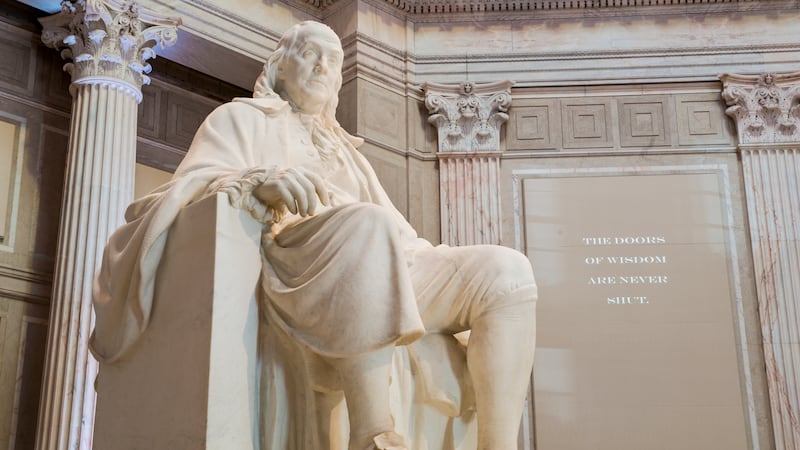Remember the days when politicians used to provide wisdom and insight that you could apply personally? When they could demonstrate some life lessons through their own actions; lessons that that we could perhaps use as a way to help make ourselves better?
No? Don’t blame you. Modern politics seems to exist in a vacuum of self-importance, oneupmanship, lowest common denominators and self-interest. I can’t think of many modern politicians who have demonstrated some form of higher values or presented a well-rounded, better, approach to living life. I certainly can’t think of them saying anything that could be looked back on in 50 years’ time and considered wise or inspirational.
Now I appreciate that’s a grand sweeping statement to make a point and I’m sure in real life there are plenty of politicians, at local and national levels who are trying to do the right thing by people.
However. Ask yourself this: when is the last time you modelled any aspect of your life on how a big stage politician lived theirs?
Compare and contrast that to the old school. The ones who could and did dispense life lessons. The ones whose words and actions are still referenced as examples for improving yourself.
Take Benjamin Franklin, for example. He was one of the ‘founding fathers’ of the United States. A signatory of the Declaration of Independence (he was also involved in drafting it) he is long recognised as one of America’s most important and influential figures.

Many the most famous sayings attributed to him still resonate today:
• ‘Change is the only constant in life. One’s ability to adapt to those changes will determine your success in life’. ‘When you are finished changing, you’re finished’. In essence, change is good, it challenges you, it is the pathway to improvement and most importantly it will happen regardless, whether you are active or passive. It makes much more sense to embrace change, help shape it yourself and explore the new world of possibilities than let yourself be the victim of it.
• ‘Well done is better than well said’. Leadership is about action, not words. In politics empty promises can often be forgiven or ignored when the results do not materialise. In the microcosm of the workplace however, people will very much judge you by what they see you do, rather than what you say.
• ‘Love your enemies for they tell you your faults’. In effect; embrace criticism. It keeps you humble. It helps you see what your blind sides are. It helps you gain insight into what other people think. It therefore helps provide areas for you to improve and develop.
- Why do we only ever see it from our own perspective?Opens in new window
- A five-step guide to managing stakeholders in your organisationOpens in new window
- Take time to say thanks to those who pack our 'work parachutes'Opens in new window
- Take responsibility and be accountable - that’s how we learnOpens in new window
There are many, many more quotes, however perhaps some of the simplest lessons provided by Franklin can be taken from looking in his autobiography where he published his ideal daily routine. Many of these habits still stand today as a useful blueprint for addressing the working day to come.
Early morning:
• ‘Rise, wash and address Powerful Goodness’. He starts by rising early and considering ‘Powerful Goodness’ (his name for God). Now whether you are a strongly religious person, a deeply spiritual person or a committed atheist; focusing for a few minutes on prayer, practising some mediation or simply engaging in a little Niksen (see, it’s not just comedians who can do callbacks) can be a powerful way to clear the mind and get set for the day ahead.
• “Contrive day’s business, and take the resolution of the day’. Mind cleared; the next step was to focus on the day ahead. What needed done, what were the challenges what were the priorities. What were you going to face and in what order should they come, how should they be prioritised?
• ‘Prosecute the present study’. Essentially, keep learning. Time was set aside for Franklin to spend time on progressing himself, educating himself, challenging himself. How do we expect to grow ourselves if we don’t take time to learn something new. It doesn’t have to be work related, it could be learning a new language, playing the guitar. Continuous learning keeps us fresh, keeps challenging our brain, keeps our minds active.
• ‘The Question. What good shall I do this day?’ Would more of us have better days at work (or in life) if we stopped to consider how we were going to contribute something good to the next number of hours. How to leave the day better than we found it (or leave people with the impression of increase…the callbacks just keep coming!)
Late morning and afternoon:
• ‘Work’. Even the great and good understood that time simply has to be dedicated to this in order to succeed.
• ‘Read..and dine’. The importance of taking a break, to reset by reading and having something to eat cannot be overlooked. The body needs time to rest and nourish itself. So does the brain. Skipping lunch may seem like some form of power move however running on empty (physically and mentally) does nothing for you, other than make you more prone to mistakes and exhaustion.
The evening:
• ‘Examination of the day’ Take time to reflect on the day past. Did you achieve what you set out to do. Did you get things done the right way? It’s important to reflect contemporaneously on what went well and what didn’t, so you know what to continue with, or fix, moving forward and don’t allow memories of the events to become hazy.
• ‘The Question. What good have I done today?’ Regardless of whether you achieved something positive in terms of work (higher production, more sales etc) did you actually contribute some good to the universe. Did you make someone’s day better?
• ‘Put things in their places’. Compartmentalisation is key. Work when it’s time to work, play when it’s time to play, socialise when it’s time to socialise and rest when it’s time to rest. Don’t let work concerns bleed over into your private life. Working, or even just thinking 24/7 about work, can dramatically (and negatively) detract from all the other aspects of your life.
• ‘Music or diversion, or conversation’. Learn to switch off and decompress. Your body and mind need time off and you need to enjoy the fruits of what you are working for.

In an era where politicians all over the world are more likely to be quoted for some crazy soundbite maybe we do need to look further back to gain some actual wisdom that can help whether at work or just in everyday life.
Benjamin Franklin is a good place to start.
- Barry Shannon is head of HR at STATSports


